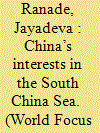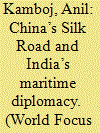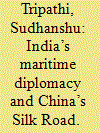|
|
|
Sort Order |
|
|
|
Items / Page
|
|
|
|
|
|
|
| Srl | Item |
| 1 |
ID:
147977


|
|
|
|
|
| Summary/Abstract |
Dominance of the South China Sea is not merely a territorial issue for China but, more importantly, one which it regards as a major step towards recognition as an unrivalled Asia-Pacific power that can arbitrate on global and regional issues along with the US. Since the 18th Congress of the Chinese Communist Party (CCP) and appointment of Xi Jinping simultaneously to China’s three top posts in November 2012, the world is witness to a new thrust to China’s already assertive foreign policy. Early in Xi Jinping’s term, China launched major, bold, geo-strategic initiatives aimed at expanding China’s diplomatic and economic influence and military power well beyond its frontiers.
|
|
|
|
|
|
|
|
|
|
|
|
|
|
|
|
| 2 |
ID:
147988


|
|
|
|
|
| Summary/Abstract |
‘Regionalism’ has emerged as the most important aspect of contemporary international relations. Across the world, the countries are preferring to form regional groups to achieve the goals of peace and development. Instead of being a grand global narrative, politics is increasingly becoming regionalized, resulting in significant changes in the power dynamics at both regional and global level. There are efforts to build up regional networks and infrastructure to expedite the processes of resource generation, mobilization and economic modernization. In Asia, however, the push towards regional integration runs into political tussle as the two major actors-China and India- try to counter each other and have parallel regional network projects.
|
|
|
|
|
|
|
|
|
|
|
|
|
|
|
|
| 3 |
ID:
147975


|
|
|
|
|
| Summary/Abstract |
The OBOR strategy has become China’s major foreign policy goal, Beijing will promote this initiative economically, politically, militarily and culturally over the next eight to ten years. For India, there are lessons from this. New Delhi also benefits from at least reasonable ties with most stakeholders in the New Silk Road, including Iran, where India has invested heavily in the Chabahar Port. But India must also make serious efforts to strengthen its links with Southeast Asia, and for this it must maintain stronger ties with Bangladesh. New Delhi will also need to work towards a manageable relationship with Pakistan, which would not only facilitate pipeline projects like TAPI, but also enable access to Afghanistan and Central Asia.
|
|
|
|
|
|
|
|
|
|
|
|
|
|
|
|
| 4 |
ID:
147997


|
|
|
|
|
| Summary/Abstract |
Indeed, India enjoys far greater influence in the Central Asia than China does and is a more acceptable role-player in addressing the security and economic concerns of the region. The Central Asian countries will also avoid firm alliances with world powers and, like India, will generally pursue policies of flexible alignment. India’s advantage is not location, and certainly not demographics, but its inherent and implicit pluralism.
|
|
|
|
|
|
|
|
|
|
|
|
|
|
|
|
| 5 |
ID:
147986


|
|
|
|
|
| Summary/Abstract |
India, while clinching on its rechristened Look East Policy, must act towards evolving a regional bonding of greater Asia as a regional bulwark against the backdrop of mounting tensions in the Indo-Pacific region due to rising Chinese expansionist assertions based on bullying tactics of its awesome military power, accompanied by economic allurements under its silk road initiative in Central Asia and string of pearls scheme in littoral regions of Indian Ocean and adjoining areas with ultimate purpose of establishing its hegemony all over the world. In this scenario, India needs to strengthen its strategic relations with all the littoral countries around its maritime zone and beyond to include all Southeast Asian nations, Persian-gulf, West Asia and African continent so as to strengthen and consolidate its maritime diplomacy and consequent naval strategy.
|
|
|
|
|
|
|
|
|
|
|
|
|
|
|
|
| 6 |
ID:
147981


|
|
|
|
|
| Summary/Abstract |
As India China turn their gaze seaward in search of prosperity and energy security, both have embarked on a naval build up unprecedented in the nation’s modern history. Both countries in earlier centuries participated in mercantile trade and had their association with Southeast and South Asian nations. Indian leadership and strategic experts have been trying to revive the grand old strategy of ‘Indian Ocean being regarded as British lake/Indian lake’, therefore commanding the entire region as maritime power. China’s contemporary leadership also sees their rise as economic, military, and naval power as merely the latest phase in a benign regional dominance that had its origins in the Ming era. India and China, both today are busy in their naval build-up and fierce diplomatic manoeuvres and are trying to prevail upon their neighbours/coastal nations not to align with external powers to balance them.
|
|
|
|
|
|
|
|
|
|
|
|
|
|
|
|
| 7 |
ID:
147976


|
|
|
|
|
| Summary/Abstract |
The South China Sea (SCS) has the potentials for triggering a major regional conflagration, which unless resolved by diplomatic means might engulf the world with debilitating consequences. The nature of the dispute centred on the body of water in the SCS took a dramatic turn following the ruling by the international United Nations-backed tribunal, the Permanent Court of Arbitration (PCA) on 12 July 2016, which came in favour of The Philippines and against China’s expansive claims to rights in the SCS. The court found that China does not have any legal basis for historic rights to economic resources and therefore violated the Philippines’ sovereign rights and Exclusive Economic Zone (EEZ).
|
|
|
|
|
|
|
|
|
|
|
|
|
|
|
|
|
|
|
|
|